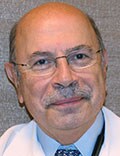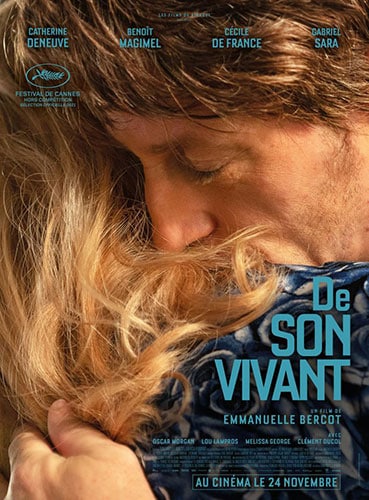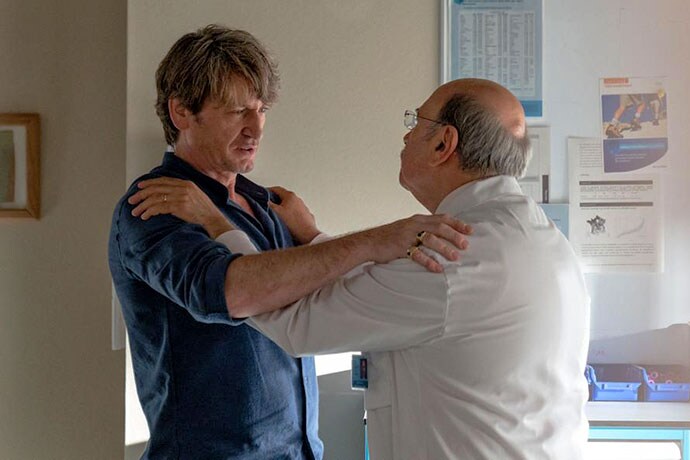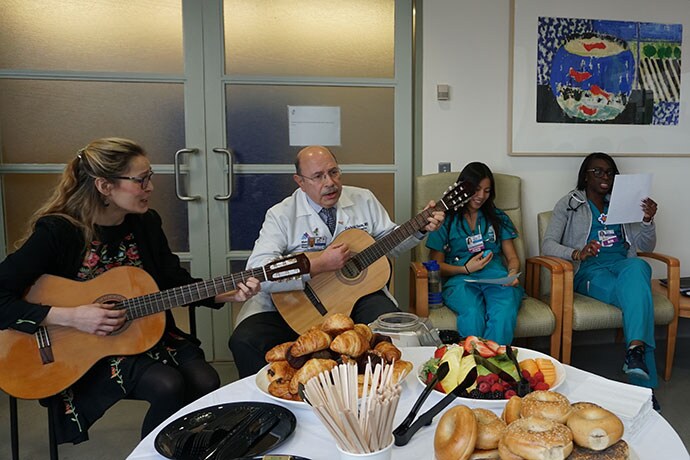When New York oncologist Gabrielle Sarah called French actress and director Emmanuelle Perco after showing one of her films in Manhattan, she dreamed big.
He never imagined that he would think so big.
He said, "I thought maybe he would make a movie based on some of my beliefs."
"Mom, do you want to go to the crab pit?" He asked her and invited her to visit the oncology department at West Mount Sinai.

Dr.. Gabrielle Sarah
The Parisian Frenchman, a physician of Lebanese descent, by a slight glimmer of his hands or an eternal gleam in his eyes, persuaded some Bercots to do so. After the visit, he decided to build the entire film around the Doctor's dying philosophy and even portrayed him as a hero.
"What you're doing is amazing and amazing," Barcot said in an interview at the 2021 Cannes Film Festival screening of The World (De Son Vivant) , with no formal acting training.
“We brought this guy in from the oncology department, and he is as real and real as you can get in a doctor's office,” he said.
“Most of my conversations — maybe most of them — come from things I shared with Emanuel,” he told Medscape . “He took information from me and wrote the whole story. He studied my personality and really found all the messages that I wanted to share.”
He also said that it became easier to play with the pros when he realized that he was playing alone. “At some point… it crossed my mind. Let me stop playing - I have to be myself, ”he recalled.
Mirny , screened in French with English subtitles, is nominated for Best Film at the Lumières Awards 2022.
It tells the story of a 39-year-old man (played by French actor Benoît Magimel) with stage IV pancreatic cancer and his journey with his mother (played by renowned actress Catherine Deneuve), through diagnosis, rejection, and ultimately her death. . Circumstances are coming.
It is also the story of an oncologist, played by Sarah herself, who takes the patient by the hand and refuses to hide the truth because she believes that only by facing the truth can patients live and then die in peace.
“You will never hear me say that I am going to cure cancer. If I did, I would be a liar,” he tells his patients in the film.

Pace , in which Dr. Gabriel Sarah plays a sympathetic oncologist, was nominated for best film at last year's Lumiere Awards in France.
“Patients put their lives in your hands, so if you don’t tell them the truth, you betray them,” he explained in an interview. “I refused to see patients whose families wouldn’t let them come to the clinic to hear the truth… No one hears the truth and doesn’t feel good the next day, but the truth helps them focus on what they need to work on. Once they focus, they take control… What scares patients is losing control.”
His approach may seem harsh, but in the film he is shown modestly. “She [your mother] thought that half the truth would hurt you, half the truth,” she calmly told her patient, “but the worst thing is to realize that someone is lying to you ... It’s so difficult for us to get through, there is no place for lies .. For me, the truth is non-negotiable.”
Sarah is full of stories of real patients whose lives are enriched and strengthened by the clarity they gain from knowing the whole truth.
However, not all oncologists agree with his approach.
After the film was shown in other parts of the world and even in the United States, he met many doctors who strongly disapproved of his uncompromising honesty. He said: “You always have someone who says, you know that in America you will accept the truth, but not in our culture – people are not used to it. I hear it all the time."
“A long time ago, I decided not to accept this conversation. The truth works for all patients in all cultures,” Sarah confirmed.
“But as caregivers, we need to be empathetic and responsive to the culture we are dealing with. Content should always be 100% candid, but we tailor our language to the patient’s culture and mental state to make it work.” Get the message across,” he added.
Helping patients digest news about their diagnosis and prognosis is also a good recipe for job survival. He is now 68 years old and has recently retired from his role as Medical Director of Chemotherapy and Executive Director of the Patient Services Initiative at Mount Sinai West. He says he recovered from 40 years of practice with ease. By learning to follow the rhythm of each patient.

Benoît Magimel (left) and Dr. Gabriel Sarah in Pacible (De son vivant) . Magimel plays a patient with pancreatic cancer and Sarah plays an oncologist.
“My recipe is tango,” she laughs. Tango's regular appearance in the oncology ward is just one of the many real-life tricks that Barcot uses in the film. “I think we have to be very sensitive to the feelings of our patients,” he explains. "We have to feel the emotions of our patients and work with them," he told the audience after a speech in New York. "If you are not in sync with your partner, you are traveling together and you are both going to fall." . City
“I really try to take my mind off everything else to be with the patients – that’s what it means to me to be there – to be there for them, to be there for them. And spend time with them. makes me feel like I'm number one. I can go to the next page "without getting tired."
A key scene in the film occurs after the patient's shocked mother discovers a merry tango in her son's room and angrily confronts the doctor.
“I feel like I left him,” she said tearfully as doctors begged her to accept that her son’s chemo was no longer effective and to let him live the life he left behind. “Let him go,” he demanded. "This will be your greatest gift of love."
Sarah encourages this approach among her employees. He warns them about the "hero syndrome" in which dying patients feel the need to "say yes" and "fight" for their caregivers and their families.
“The patient never asked to be a hero, but our situation told him that he was,” he says in the film. "He put him in unbearable bonds because he believed that if he surrendered, if he died, he would betray his followers. He needed the opposite of this: to be released. He needed permission to die, and this permission was given by two people: his doctor and his family."
Of course, not all cancer patients have such a terrible prognosis, and treatment comes first when it feels right. "Yes, if there is no replacement for them, I will be aggressive to protect them. But when there is an incurable disease, my patients go bankrupt, and I try to cure them. I am ready to give them poisonous medicines. Hands, stormy. Take them if you think, that it will heal what they have, and I will teach them to accept pain.”

In the film and in real life, Dr. Sara often plays guitar with her staff during breakfast music sessions, where she encourages patients to express their feelings about their struggles.
He also believed in physical contact with patients. “If we are close to the patient, we can at least get an idea of what kind of person it is,” he says. But his wife, Nada, notes that medical checkups sometimes scare patients. "He told me, 'If you have a tie, they might want to see it.' Thus began a collection of about 30 beautiful bandages adorned with unicorns or jellyfish, depending on the preferences of different patients.
In the film, her patient teases her about this oddity, but Sarah insists it's a logical little gesture. “One patient told me about love bugs. He saw them in the kitchen when he was sick, so love bugs became a sign of hope for him. I told this story to my wife... and she bought me a tie with love. He pinned it and my patient when she was thrilled to wear it."
In the film and in real life, Sarah often plays guitar with her staff during breakfast music sessions, where she encourages them to express their feelings about a patient's suffering. "If you cry, don't be ashamed," he says in the film. "Your patient will feel that you are with him." In the final scene, wearing a muddy tie, he tearfully says goodbye to his patient. “They were real [tears],” she recalls. “Because I really felt like I was seeing a dead patient. That's how it really was."
Keith Johnson is a Montreal-based freelance medical journalist who has been writing in all areas of medicine for over 30 years.
For more information, follow Medscape on Facebook, Twitter, Instagram, YouTube and LinkedIn.



.png)
Post a Comment
Post a Comment